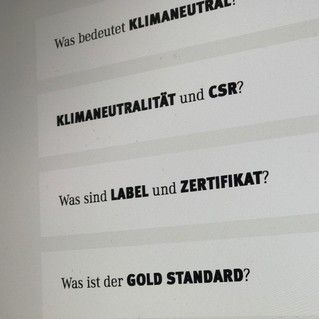THESis:
A few years ago, the sustainable orientation of a company was still a figurehead;
companies were able to differentiate themselves from competitors.
That succeeds less and less!
Meanwhile most customers expect companies to conduct climate change activities and a sustainably production or offering of their products or services, but:
Could companies not get in trouble when they´ve commited their sustainability efforts as the sole USP?
Sandra Millei:
From my self-image, I have a completely different view and also have a different view of things:
Still far too few companies have anchored the topic of sustainability holistically into the core of their company.
For some companies, sustainability is more of a marketing theme - that's right, others on the other hand are more likely to associate commodity and production policies in the company, and for others the whole issue is nonsense anyway and does not have anything to do with them.
At this point, we should perhaps also consider that the economy, profit maximization, expansion and cutthroat competition can not at first be combined with the topic of sustainability.
Let's take a look at the textile entrepreneur who has so far produced his goods in Bangladesh. The goods are cheap, the delivery dates binding and the entire production process is coordinated. Of course, this entrepreneur knows that the production of his goods happens in conditions that he would never accept for himself. But he does not see this as his theme and pushes the responsibility for grievances far from himself. The argument: His customers would not accept an increase in the price of their goods, which would lead to a rethinking or relocation of the production site. He has already shirked his responsibilities, because he would like - but his customers do not want. And now each of us would have to ask ourselves if we really would be prepared to buy the products of this textile producer if prices rose by 50%. No, we would not. As consumers, we are not even able to pay a fair price for well-produced meat. So let's not pretend that sustainability has arrived in companies and those who do nothing are more of a fringe group.
I also do not think that as consumers we would ever renounce in favor of others, if only to stabilize our ecosystems.
Voluntary renunciation on a large scale has never worked in human history. And if so, then it would have to be our task to firmly integrate sustainability and fair dealings with other economic operators into products.
The consumer would have the great advantage that he does not have to deal with this issue, but that he buys kinda sustainability and fairness.
Or let's have a look at the discussion with the To-Go takeaway mug. Instead of making sure that recyclable products find their way into recycling as often as possible, we discuss the takeaway mug or a deposit on the paper cup. However, the fact that the paper cup, or pulp, often comes from sustainably managed forests that are explicitly designed to be gentle on renewable raw materials, is rarely mentioned by anyone.
I only notice that disposal options for recyclable materials are increasingly disappearing from the cities, because municipalities want to save the high costs of disposal. I think the consumer will not give up his coffee to go in the future and because we all know we should work better on more effective disposal options.
Instead I would like to wish a much broader discussion about brown coal conversion.
About the fact that our federal government is subsidizing these CO2-slingers in the next 10 years through our taxpayer money in order to make the exit as gentle and yield-optimized as possible for the operators.
To be committed to sustainability and to establish it as part of the company's alignment is different from being seen as a sustainable company in the market.
Marketing strategists spend billions around the world to give brands a so-called brand core, that is, to connect with values. This is a very lengthy process and only those companies are successful who holistically live the topic from the inside out.
At some point, after years of good work, successful products, consumer-oriented service and many other important components, it is then also possible for the consumer to recognize and reward sustainability in the corporate or brand core.
Anyone who combines or equates sustainability with a potential USP does not recognize that sustainability is part of this company or even the core of the brand. Equal to product quality, service, dealing with suppliers and employees, used or processed raw materials, exclusion of child labor, etc.
All this together creates for consumers a world in which the brand is better, ie active - or worse - passive.
Companies or brands that operate more secretly, refrain from deliberate communication of the brand essence, are arbitrary and interchangeable.
To summarize, I think that sustainability is still far from being received by businesses and demanded by consumers. Here must urgently be counteracted and rethought.









